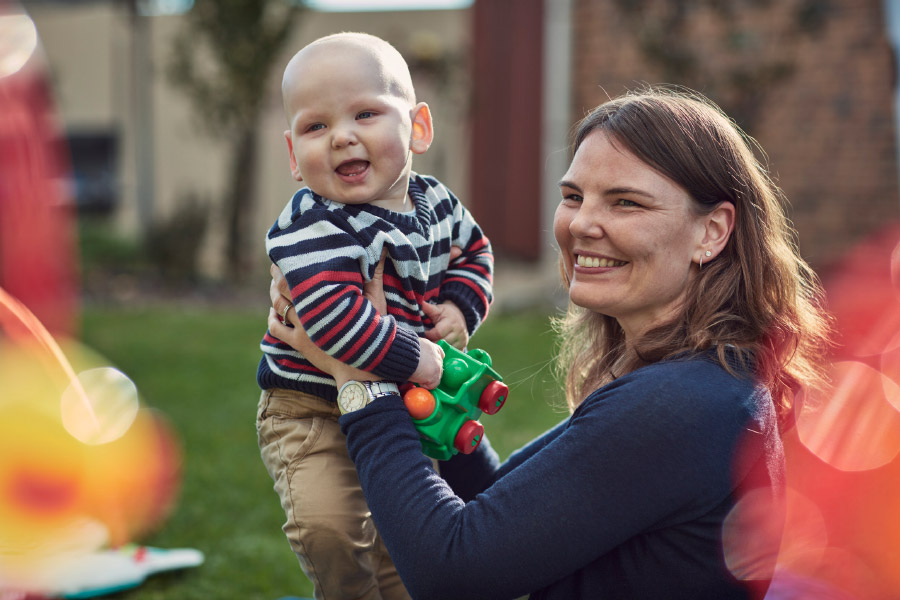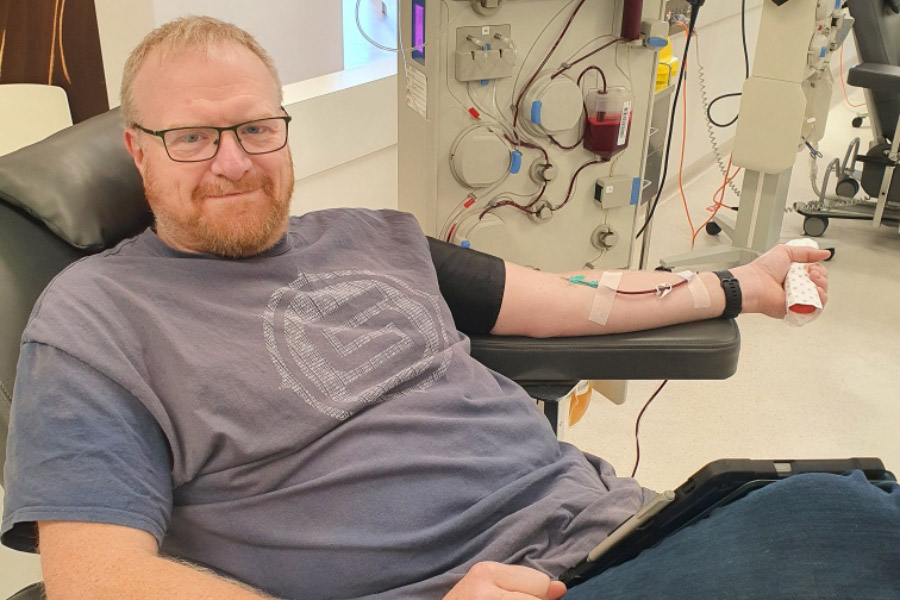Half a million Australians helped
Over half a million Australians helped to change the lives of others by donating blood this year. Through the efforts of these generous donors we delivered 972,260 blood products (red cells, plasma, platelets and serum eye drops) to hospitals and healthcare provides. We also delivered over 2,000 litres of breast milk to babies in neonatal intensive care units. That’s 22,821 bottles of milk making a difference to the littlest Australians.
Read more in the Lifeblood Annual Report 2019-20 »
Making it easier to give
We made the life-changing act of giving blood even easier, with the roll out of our new electronic donor questionnaire and improvements to our Lifeblood app. The paperless questionnaire is one of the largest technological transformations we've undertaken; pleasingly it’s now live in our 96 donor centres. Almost 400,000 donors have already used iPads or tablets to securely submit their important health data directly to the National Blood Management System, the core platform that manages the supply of blood products for Australian patients.
When generous Australians visit a donor centre to give plasma, we use special machines to separate their blood, collect the plasma and return their red cells. As part of our unrelenting focus on the safety of our donors and meeting the nation’s need for life-changing plasma, we replaced our aging fleet of plasma machines with efficient new machines. They’re not only easier for our people to use but provide donors with a more comfortable experience and deliver a better yield, resulting in higher quality plasma.

When William was born nine weeks early, his mum Karen recalled that "he was absolutely tiny and fragile, and it was a bit overwhelming". He was in hospital for just over a month and received donated breast milk the whole time while Karen worked to build her supply. "It really is such a generous and precious gift that they’re giving to help a little baby who otherwise wouldn’t have access to it,” Karen said of donors. Now, William's a healthy bub who loves to smile at everyone. Photo: Sean Izzard
Improving health outcomes
We provided 803 tonnes of plasma, the most ever, as part of our strategy to deliver a cost-effective supply of plasma products for Australian patients. We introduced new blast freezer technology at our Melbourne and Perth processing centres so we can accommodate increased volumes of plasma, meaning we can process it more efficiently and provide plasma-derived products of even greater safety and quality for Australian patients.
Thanks to our breast milk research, vulnerable pre-term babies could have access to new products to help them grow and thrive. Our researchers are leading investigations to better understand their nutritional needs. This year over 300 new mums donated breast milk to help Australia’s smallest patients. We expanded our supply of donated breast milk for babies in neonatal intensive care units to include Townsville Hospital in Queensland, following the successful launch of the service in New South Wales and South Australia.
Patients suffering from a debilitating gut infection will have access to life-changing treatments of faecal microbiome for transplantation, thanks to a trial by Lifeblood Microbiome and Fiona Stanley Hospital in Perth. Our Lifeblood Microbiome facility at Perth Processing Centre is now fully set up and close to operational. In March 2019 we successfully recruited our first donors. It’s all part of our drive to use our unique infrastructure, skills and position in healthcare to deliver improved health outcomes for Australians.
Working smarter
Lifeblood has an unwavering commitment to maintaining exemplary safety and quality standards and to continuously improve.
We’re equipping our processing centres with new automation and enhanced technologies to support the manufacture of blood and biological products with even greater safety, quality and efficiency into the future.
We’re continuing to grow our capacity to meet Australia’s demand for life-changing plasma products. We completed two pilot projects for plasma donor centres in Townsville and Canberra with excellent feedback from donors about their experience. The lessons we learnt will inform our future growth in collecting plasma.
We’re transforming our laboratories to make sure the Australian healthcare sector continues to have access to world-class blood testing systems and services. This year we implemented the first new automated instruments for our blood testing systems, which will provide health benefits for Australian patients, increase our efficiency, generate cost savings and improve safety for our people.

Recovered COVID-19 patient Damian was labelled a 'super donor' for the very high levels of antibodies in his blood. He was just one of the Australians who donated convalescent plasma to help patients still battling the disease. Damian’s plasma is being used by CSL Behring to create a super-boosted immune product. “If my plasma can help anyone, I'm always happy to give it away," Damian said.
Delivering during the pandemic
As the coronavirus pandemic unfolded, we focused on our role as an essential service.
We rapidly adapted and worked flexibly to ensure our facilities remained places of wellness. We also put in place additional public health measures, including social distancing, and transitioned a third of our workforce to work remotely. We worked at pace to ensure blood samples arrived within timeframes for testing despite closed borders, and overcame significant supply and logistical challenges to minimise the impact on our life-changing work.
We also moved quickly to ensure our products remained safe for use by Australian patients. We have well established processes to identify emerging infectious diseases which may be of relevance to blood safety, and information indicated that transfusion-transmission of SARS-CoV-2 (the virus that causes COVID-19) was extremely unlikely. We also undertook a study with the Kirby Institute that demonstrated pasteurisation effectively inactivates SARS-CoV-2, confirming our pasteurised donor breast milk was safe for vulnerable babies.
Convalescent plasma donated from people who have recovered from COVID-19 may help boost the immunity of patients still battling the disease. We collected plasma from generous Australians who had been symptom-free for 28 days to support two trials: the Australasian COVID-19 Trial and the international REMAP-CAP trial. A super-boosted immune product is now being produced by CSL Behring.
Our work is only made possible through the donations given by everyday Australians. During the pandemic we needed our blood donors more than ever – they strongly supported us throughout and for this we are immensely grateful.